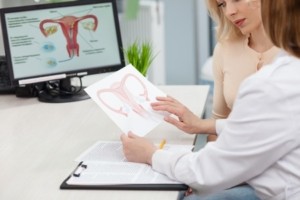
Almost 60% of women have fibroids, although most will not experience any symptoms. Uterine fibroids are non-cancerous and, generally, your gynecologist will just monitor them. However, when should you do something about fibroids?
Two Main Fibroid Types
Uterine fibroids are characterized by their location. Mucousal fibroids are the most common and are located in the muscle or body of the uterus. Submucousal fibroids are found inside the uterus.
- Mucousal fibroids generally go unnoticed, as they tend to only cause symptoms when they are large. As the fibroids grow, they increase the size of the uterus and cause heavier, more painful menstrual cycles. Mucousal fibroids can also cause constipation, changes in bowel movements or, in rare cases, kidney damage if they grow large enough to put pressure on the colon or ureter.
- Submucousal fibroids are less common and are more likely to cause symptoms. Since they grow on the uterine lining, or endometrium, submucousal fibroids can inhibit implantation and make it more difficult for you to conceive. They can also cause heavy, painful periods as the uterus contracts around the fibroid.
Treating Fibroids
Your gynecologist will use regular exams and ultrasounds to diagnose and monitor uterine fibroids. Unless your symptoms worsen, your OBGYN will monitor the fibroids’ growth. If your symptoms begin to interfere with your daily life, your gynecologist may recommend hormone treatment or surgery.
- Hormone therapy consists of taking an oral hormone pill, or birth control, or an IUD with progesterone. Progesterone works to thin the uterine lining, which reduces the heaviness of your period.
- Surgery can be an effective treatment to remove submucousal fibroids. In a procedure similar to a D&C, your OBGYN will scrape the fibroid out of your uterus. For women living with mucousal fibroids, surgery to remove fibroids can be more challenging. Typically, hysterectomy is the best treatment once you’re done having children.
Uterine fibroids are common in women of all ages. If you are experiencing painful, heavy periods- call our office to determine if fibroids may be to blame.





